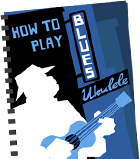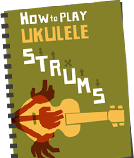Get Plucky with the Ukulele is the new book by Will Grove-White off of the Ukulele Orchestra of Great Britain and his own group Will Grove-White & the Others.
As you would expect of someone who started playing the ukulele when it was ignored and deeply unfashionable in the 80s, Will has an obvious deep love of the ukulele. And that’s reflected in this book’s wealth of uke knowledge, anecdotes and photos collected over decades of playing.
The book does a full sweep of the ukulele. The first half covers the history of the ukulele and notable ukulele players (those famous for ukulele, famous for their music and famous for other reasons). And the second half delves into how to play the ukulele. The writing is witty, informative and opinionated. I heartily recommend picking up a copy.
Will was kind enough to send me one and here are a few of my favourite bits to whet your appetite.
Laura Dukes, Rabbit Muse and Charlie Burse
Great to see these three getting some attention. It’s a crime that all Rabbit Muse‘s music is all still out of print.
Usually I’m the sort of pedant referred to in the book who points out that a tenor guitar isn’t a ukulele. But that Charlie Burse clip is so great I’m willing to overlook it.
The Ukulele Built in a POW Camp
For sheer bloody minded ukulele fanaticism in the face of misery and torture, Second World War veteran Thomas Boardman has to take the first prize.
There are a bunch of profiles of musicians and other famous folks who play the ukulele packed with interesting detail and anecdotes. But my favourites are the less well known like Greenwich Village ukulele painter Bobby Edwards.
The most impressive is the story of Thomas Boardman who managed to build himself a ukulele from whatever bits of wood, metal and wire he could scavenge as a prisoner in a Japanese POW camp in World War II. If you ever find yourself in the Manchester Imperial War Museum search it out.
America Takes Hawaii (And it’s Ukulele)
It came as no surprise that when in 1893 a group of European and US businessmen (with some gentle support from a group of US marines overthrew the Hawaiian monarchy…
Too many histories of the ukulele gloss over the machinations behind the uke’s first big push into popularity. So it’s good to it being pointed out that the ukulele was used by the businessmen who stole Hawaii from the Hawaiians to drive tourism to the island and fill their pockets.
Aside: After this good work it’s a bit of shame that he includes a couple of illustrations of the ‘topless Hawaiian hula girl in a grass skirt and lei’ variety.
Part of the strategy of these businessmen was to use songs and images to present a Hawaii packed with pliant, nubile women. And those songs and images are, unfortunately, still part of ukulele culture. With the huge contribution that Hawaiian women have made to the ukulele world it’s time to cut that bullshit out.
This is a criticism of the ukulele world in general rather than the book in particular. The writing in the book is very strong on the contribution of Hawaiians and women in general to the ukulele. And I think it provides the framework for understanding why these images are part of ukulele culture.
If this sort of thing is your bag I wrote a whole thing about music and cultural appropriation.
Agatha Christie Murder Solved by Uke
You caught her round the throat with it and strangled her… And you put another string on the ukelele – but it was the wrong string, that’s why you were so stupid.
*Spoilers for the 80 year old short story The Bird with the Broken Wing.* It gives me great pleasure that a character would be undone by their lack of uke knowledge.
The book also has the real-life murderous tale of Frederick Galloway ‘The Ukulele Slayer’.
Playing in a Ukulele-Only Group
Even though you’re all playing the same instrument, you don’t all have to play the same thing.
This is the bit I was really looking forward to. The only other people as well qualified to write about this are also in the UOGB. And with the number of people who are part of ukulele groups there’s no shortage of need for help on this.
Unfortunately, there’s just half a page on this. But it’s a good half page. And I’m still holding out hope of a full book on the subject from one or more members of the UOGB.
Links
Buy on Amazon UK
Buy on Amazon US
More on WillGroveWhite.com



The guy who put the wrong string on was actually just switching to low-G. He’s innocent, I swear!